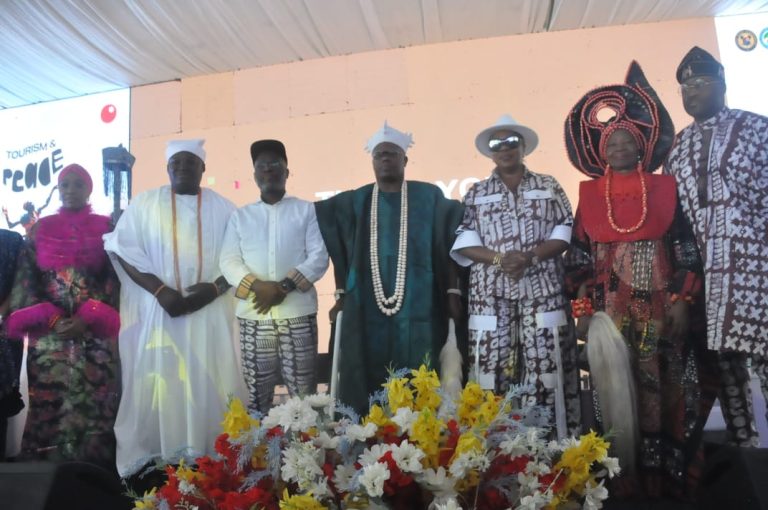The Oniru of Iruland, Oba Abdulwasiu Omogbolahan Lawal, on Friday said that the Tourism sector is currently contributing N4.1trillion to the Gross Domestic Product (GDP) of Lagos State, amounting to 10 per cent of the state’s GDP annually.
The royal father, who was the Lagos State Commissioner for Agriculture under the administration of Governor Babajide Sanwo-Olu from August 2019 to June 2020, made this disclosure, while speaking as a lead panelist presenter at the World Tourism Day celebration organised by the Lagos State Ministry of Tourism, Arts and Culture.
The Oniru of Iruland, Oba Lawal, while speaking at the World Tourism Day celebration, theme: “Tourism and Peace,” which took place at Muri-Okunola Park, Victoria Island, said that Lagos being Nigeria’s bustling economic hub, has immense potential in the tourism sector that attracts tourists from around the world.
“Lagos, Nigeria’s bustling economic hub, has immense potential in the tourism sector. The city’s rich cultural heritage, vibrant arts scene, and beautiful beach fronts attract tourists from around the world,” he said.
The monarch, however, noted that the tourism sector in Lagos faces challenges, including inadequate infrastructure and security of property rights concerns, among others, saying that efforts to address these challenges were being pursued.
According to him, the efforts included investments in infrastructure and security enhancements, in order to create a more conducive environment for tourism.
Besides, the monarch said that educational initiatives targeting youth had also been implemented, focusing on hospitality training and cultural education, adding that these initiatives had “created job opportunities for young people, reducing unemployment and fostering social cohesion.”
“Lagos, Nigeria’s bustling economic hub, has immense potential in the tourism sector. The city’s rich cultural heritage, vibrant arts scene, and beautiful beach fronts attract tourists from around the world,” he said.
“However, the tourism sector in Lagos faces challenges, including inadequate infrastructure and security of property rights concerns.
“Efforts to address these challenges have included investments in infrastructure and security enhancements, creating a more conducive environment for tourism.
“Educational initiatives targeting youth have also been implemented, focusing on hospitality training and cultural education. These initiatives have created job opportunities for young people, reducing unemployment and fostering social cohesion,” he added.
Also at the event, the State Commissioner for Tourism, Arts and Culture, Toke Benson-Awoyinka, affirmed that Lagos was not only committed to promoting tourism as an economic driver but also a tool for fostering peace.
The commissioner described the year’s theme as timely and significant, saying that it allowed people “to reflect on how tourism, beyond being a tool for economic development, serves as a bridge for peace, understanding, and unity among people and nations.”
According to him, Lagos, as a dynamic hub of culture and commerce, understands the power of tourism in building not only an inclusive society but a peaceful one, saying that people “are able to connect with the world, break down cultural barriers, and offer a platform where differences are not just acknowledged but celebrated.”
Affirming that the tourism sector serves as a powerful catalyst for fostering peace, Benson-Awoyinka noted as visitors from around the world engaged in an exchange that promotes mutual respect, tolerance, and friendship as they explore different lands, meet new people, and experience diverse cultures.
“As visitors from around the world explore different lands, meet new people, and experience diverse cultures, they engage in an exchange that promotes mutual respect, tolerance, and friendship.
“It is this spirit of shared humanity that can turn tourism into an engine for peace and reconciliation, and it opens hearts and minds to new ways of thinking, living, and coexisting,” she stated.
Speaking further, the commissioner said that the tourism sector’s initiatives continued to elevate Lagos as a global tourist destination, where cultural diversity is showcased, and the rich heritage is shared with the world.
According to her, this has confirmed that Lagos remains – beacon of cultural and tourism excellence, saying that the tourism sector collaboration with Sterling Bank was a testament to the power of partnerships in driving the growth of this vital sector.
“Through this joint effort, the state hopes to strengthen the narrative of tourism as a path to peace and reconciliation, demonstrating how tourism can create opportunities for sustainable development while bringing people closer together,” she said.
The commissioner, while commending all tourism stakeholders, partners, and the local communities for their contributions to the growth of tourism in the state, pointed out that as “the backbone of this industry,” their dedication had helped the state to maintain its position as a leading tourism destination in Africa.
“You are the backbone of this industry, and your dedication helps us maintain our position as a leading tourism destination in Africa,” the commissioner affirmed.
ALSO READ THESE TOP STORIES FROM NIGERIAN TRIBUNE
